Bělohlávek, Conductor / Czech Philharmonic Orchestra
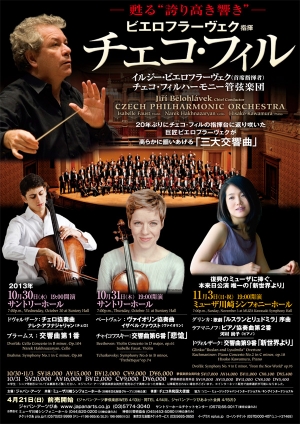
- Date
- 2013/10/30(Wed)
- Date
- 2013/10/31(Thu)
Ticket InformationTicket Information
[Ticket price]
[10/30]S: 18,000 A: 15,000 B: 12,000 C: 9,000 D: 6,000 (YEN)
[10/31]S: 20,000 A: 16,000 B: 12,000 C: 9,000 D: 6,000 (YEN)
[11/3]S: 18,000 A: 15,000 B: 12,000 C: 9,000 D: 6,000 (YEN)(YEN)
[How to purchase tickets]
1. Telephone orders
Japan Arts Pia Call Center: 03-5774-3040
(Open 10:00 a.m. – 6:00 p.m. daily, except in the New Year holiday period)
*To order from the call center, you must be able to provide a mailing address in Japan or pick up the tickets at a convenience store in Japan.
*Operators speak English.
2. E-mail Order
*Anyone can order by e-mail by filling in the required items on the specified form.
*Credit card payment is required. Tickets will be picked up at the venue on the day of the performance. The same-day pick-up counter opens 45 minutes prior to the start of the performance.
*Your personal information will not be used for any purpose other than processing this ticket order.
Notes:
*Please be aware that the requested tickets may no longer be available.
*Inquiries made on Saturday, Sunday, holidays, or during the summer or
winter business holidays, will be answered on or after the next business day.
チケット購入はこちら
[Group tickets sales]
Please inquire about group sales if you are ordering 10 or more tickets.
[Students]
Reservations for student tickets at half price each rank can be made from Aug. 1 (10a.m.) if seats are available the day before.
Qualified Students: Students below age 25 only.
Please present your student ID at the door on the day of the concert.
(Those without a student ID may be asked to pay the balance of the regular ticket price.)
[Please read the following information before purchasing tickets.]
1. Programs etc. are subject to change in case of unavoidable circumstances.
2. Purchased tickets may not be canceled or changed, except when the performance is canceled.
3. Tickets will not be reissued under any circumstances. Please take care not to lose your tickets.
4. Preschool children will not be admitted. In the case of ballet performances, children 4 years old and over will be admitted.
5. One ticket per person is required for admission to the venue.
6. All seats are reserved. Please be seated in your designated seat.
7. Photography, sound and video recording, use of mobile phones etc. in the venue are strictly prohibited.
8. Resale of tickets through internet auction sites etc. is not permitted, as problems can result.
Ticket Availability
Available / × None
Special discount
- ◎シニア・チケット=65歳以上の方はS席とA席が会員料金でお求めいただけます。
- ◎車椅子の方は、本人と付き添いの方1名までが割引になります。(ジャパン・アーツぴあコールセンターでのみ受付)
その他プレイガイド
- チケットぴあ t.pia.jp 0570-02-9999
[Pコード●●●-●●●] - イープラスeplus.jp
- ローソンチケット0570-000-407[Lコード●●●]
- 東京文化会館チケットサービス https://www.t-bunka.jp/tickets/ 03-5685-0650
- サントリーホールチケットセンター https://www.suntory.co.jp/suntoryhall/purchase/ 0570-55-0017
- 紀尾井ホールチケットセンター https://kioihall.jp/tickets 03-3237-0061
- 東京オペラシティチケットセンター https://www.operacity.jp/concert/ticket/ 03-5353-9999
- 横浜みなとみらいホールチケットセンター http://minatomirai.pia.jp/ 045-682-2000
チケット購入にあたっての注意事項
ProgramProgram
7:00p.m. Wednesday, October 30 Suntory Hall
Narek Hakhnazaryan, Cello
Dvořák:Cello Concerto in B minor, Op.104
Narek Hakhnazaryan, Cello
—————————-
Brahms:Symphony No.1 in C minor, Op.68
7:00p.m. Thursday, October 31 Suntory Hall
Isabelle Faust, Violin
Beethoven:Violin Concerto in D major, op.61
Isabelle Faust, Violin
—————————-
Tchaikovsky:Symphony No.6 in B minor, “Pathétique”op.74
7:00p.m. Sunday and Holiday, November 3 MUZA Kawasaki Symphony Hall
Glinka:“Ruslan and Lyudmila”Overture
Rachmaninov:Piano Concerto No.2 in C minor, op.18
Hisako Kawamura, Piano
—————————-
Dvořák:Symphony No. 9 in E minor, ‘From the New World’ op. 95
ProfileProfile
Jiri Bělohlávek, Chief Conductor
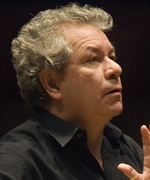
Jiří Bělohlávek was born in Prague in 1946. His love of music became apparent at an early age, encouraged by his father, a judge, who introduced his son to an array of classical music. At the age of four, Jiří joined a children’s choir, and was soon taking piano lessons. Jiří Bělohlávek went on to learn the cello with Professor Karel Pravoslav Sádlo before continuing his studies at the Prague Conservatory and at the Academy of Performing Arts in Prague. It was during these years that Jiří Bělohlávek began conducting in earnest, receiving instruction from Robert Brock, Alois Klíma, Bohumír Liška and Josef Veselka.
In 1968, the legendary Rumanian conductor Sergiu Celibidache invited Jiří Bělohlávek to become his assistant, a collaboration which culminated in Bělohlávek winning the Czech Young Conductors’ Competition in 1970, as well as reaching the final of the prestigious Herbert von Karajan Conducting Competition in 1971. It was in 1973 that Bělohlávek began conducting the Czech Philharmonic to great acclaim; the start of his long relationship with the orchestra.
Jiří Bělohlávek was appointed Conductor of the Brno State Philharmonic Orchestra in 1972, a position he held until 1978. He then became Chief Conductor of the Prague Symphony Orchestra, a partnership which lasted until 1989, and Permanent Conductor of the Czech Philharmonic. Václav Neumann, the latter orchestra’s Chief Conductor (between 1968 and 1990) brought him to Berlin’s Komische Oper in 1979, where he debuted with Smetana’s The Secret. Bělohlávek went on to conduct Stravinsky’s The Rake’s Progress there in 1980.
A decade later, Jiří Bělohlávek succeeded Václav Neumann as Chief Conductor of the Czech Philharmonic. He built upon the orchestra’s already established reputation for excellence, particularly in its interpretations of Czech music, and became part of a long line of esteemed Czech conductors to direct the orchestra: Václav Talich, Rafael Kubelík, Karel Ančerl, and his immediate predecessor Václav Neumann.
In 1994, Jiří Bělohlávek founded the Prague Philharmonia, whom he directed until 2005, when he became its Conductor Laureate. Alongside his work with this ensemble, Jiří Bělohlávek has conducted the world’s major orchestras, including the Berlin Philharmonic, Boston Symphony Orchestra, Cleveland Orchestra, Gewandhausorchester Leipzig, New York Philharmonic, NHK Symphony Orchestra, Philadephia Orchestra, Sächsische Staatskapelle Dresden and the San Francisco Symphony Orchestra, appearing at festivals including Berlin, Edinburgh, Lucerne, Montreaux, Perth, Prague, Salzburg and Tanglewood.
In 1994 Jiří Bělohlávek was named Principal Guest Conductor of the Prague National Theatre; then in 1995 he became the BBC Symphony Orchestra’s Guest Conductor, later becoming its Chief Conductor in 2006. Alongside these positions, Jiří Bělohlávek has continued his prestigious work in the world of opera, with acclaimed productions at Berlin, Covent Garden, Glyndebourne, the Metropolitan Opera in New York and many more.
In parallel with these roles, Jiří Bělohlávek has become a respected teacher of conducting. He was appointed Professor at the Prague Academy in 1997, and until 2009 was Director of the Department of Conducting. His protégés include the young Czech conductors Tomáš Hanus, Jakub Hrůša and Tomáš Netopil.
As Chairman of the Prague Spring International Music Festival, Jiří Bělohlávek has consistently championed the music of Czech composers. His special affinity with the music of Bohuslav Martinů has been instrumental in bringing that master to the world’s attention, and Bělohlávek has also taken the more rarely-performed works of Dvořák, Janáček, Smetana and Suk and to new audiences. Furthermore, he has programmed pieces by Czech composers deserving of greater attention, including Foerster, Ostrčil, Slavický and Sommer.
Jiří Bělohlávek has an extensive discography, and, as the Naxos label noted: “His most outstanding recordings are those in which he leads the Czech Philharmonic Orchestra, where the high calibre of orchestral execution and Bělohlávek’s deep musicianship result in performances of exceptional quality.”
In a much-anticipated reunion, Jiří Bělohlávek returns as Chief Conductor of the Czech Philharmonic from 2012. The outstanding musicianship of the Czech Philharmonic under Bělohlávek’s inspiring direction makes this a truly exciting collaboration. As an internationally-acclaimed conductor, Jiří Bělohlávek will direct the Czech Philharmonic on the international stage, taking the orchestra forwards in music-making which has already won great acclaim, and which is sure to do so in the future.
Narek Hakhnazaryan, Cello[10/30]
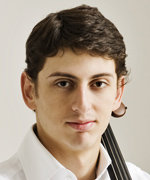
Armenian cellist Narek Hakhnazaryan, hailed by the Washington Post as a “phenomenal cellist,” exudes a confidence and seasoned professionalism that belies his youth. Born in 1988 in Erevan to a family of musicians, Hakhnazaryan completed his early studies at the Moscow State Conservatory and soon gained international acclaim as prize-winner in several major competitions including the 14th International Tchaikovsky Competition (1st prize, Gold Medal and two special prizes), Geongnam International Competition in Korea(2nd prize), Johansen International Competition for Young String Players in USA(1st prize), and Khachaturian International Competition. In 2007(1st prize and Gold Medal). Mr. Hakhnazaryan was celebrated with an award bestowed by the President of Armenian Republic. As First Prize winner in the 2008 Young Concert Artists International Auditions, Mr. Hakahnazaryan signed on as roster artist with Young Concert Artists, Inc. and debuted in the Young Concert Artists Series in New York at Carnegie Hall and at the Kennedy Center in Washington, DC.
“Watching talent of this age on this level is always a thrill. . . . his way with the instrument is that of a seasoned professional. He produces a powerful and colorful sound in all registers, nails every big shift and flashes all the virtuoso’s tricks (flying staccato, artificial harmonics, jeté, etc.) with insolent ease.” The Washington Post, on his Kennedy Center debut
The New York Times raved of his Carnegie Hall debut: “Mr. Hakhnazaryan demonstrated his considerable technical prowess . . . [he gave] a gorgeous rendition of Rachmaninoff’s Vocalise . . . [his] tone was lean but warm and supple, animating Schumann’s lyrical phrases with grace. . . . In a commanding account of Shostakovich’s Cello Sonata . . . [he] brought a daredevil verve to the intricate Scherzo . . . To the very end, Mr. Hakhnazaryan’s intense focus and expressive artistry never flagged.”
Narek has participated in master classes given by such renowned artists as Mstislav Rostropovich, David Geringas, Ralph Kirshbaum, Laurence Lesser, Paul Katz, and Steven Isserlis. In his short years, this extraordinary young cellist has toured Russia, the United States, Canada, Germany, Italy, Austria, France, Great Britain, Slovakia, Croatia, Greece, China, Japan, Korea, Armenia, and Turkey. He is presently enrolled in the prestigious Artist Diploma program at New England Conservatory in Boston as a student of Laurence Lesser and Moscow State Conservatory as a student of Aleksey Seleznyov. Mr. Hakhnazaryan plays a 1698 David Tecchler cello, on loan from Valentine Saarmaa, granddaughter of the renowned luthier Jacques Francais and the bow made by Benoit Rolland.
During the 2011-12 season, Hakhnazaryan performs as soloist with Tokyo Philharmonic Orchestra, London Symphony Orchestra and Valery Gergiev, Mariinsky Orchestra with Valery Gergiev, Orchestra Sinfonica di Milano Giuseppe Verdi, Signature Symphony Orchestra, Hilton Head Symphony Orchestra, Longwood Symphony Orchestra, Springfield Symphony Orchestra, Orchestra of St. Luke’s and will play solo recitals in Iowa State University (IA), Boston Chamber Music Society (MA), Levine School of Music (MD), Missouri State Univesrity (MO), La Jolla Music Society(CA) etc.
Last season, Mr. Hakhnazaryan’s appearances included the Young Concert Artists Festival in Tokyo and two performances in Boston’s Symphony Hall: with the Boston Pops in Tchaikovsky’s Rococo Variations with Maestro Erich Kunzel, and performing the Schumann Cello Concerto with conductor Hugh Wolff and the NEC Philharmonia. He has performed as soloist with the Long Bay, Fort Smith and Westmoreland symphonies, and in recital at the Isabella Stewart Gardner Museum in Boston, Ravinia’s Rising Stars Series, the University of Florida, Vanguard Concerts, the University of Georgia, Candlelight Concerts, Missouri State University, the Washington Center for the Performing Arts in Olympia, The Paramount Theatre, and The Colonial Theatre, among many others.
Isabelle Faust, Violin[10/31]
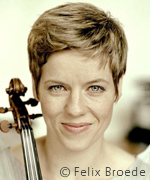
Isabelle Faust adopts a perspective on music in which ever-new experiences and discoveries are the principal focus. Having founded a string quartet when just eleven, her early chamber music experiences imbued in her a fundamental belief that performing is aprocess of giving and taking, in which listening is just as important as expressing your own personality.
Victory at the 1987 Leopold Mozart Competition, when she was just 15, brought with it the prospect of a solo career. However, the guiding principles instilled in her as a chamber musician remained strong. In Christoph Poppen, the long-time first violinist of the Cherubini Quartet, Faust found a teacher who shared and fostered these musical convictions. Whether performing sonatas or concertos, Faust constantly sought dialogue and the exchange of musical ideas. After winning the 1993 Paganini Competition, she moved to France, where she grew to love the French repertoire, particularly the music of Fauré and Debussy. Here she came to international attention with her first recording sonatas by Bartók, Szymanowski and Janácek – and gradually refined her command of the most important works in the violin repertoire.
In 2003, Faust released her first recording of a major Romantic work for orchestra, the Dvorák Violin Concerto. Having first performed the concerto at the age of 15 under Yehudi Menuhin, the work has remained a mainstay of her repertoire. Her 2007 release of the Beethoven violin concerto also reflects her immersion in period performance practice – not interpreted dogmatically but used as a challenge and incentive to re-assess the substance of every note, in order to comprehend its purpose and meaning. For Faust,the ultimate importance of musical dialogue necessitates establishing a common language between performers, enabling artists to perform a Mozart concerto with an ensemble such as Concerto Köln as convincingly as with a large symphony orchestra.
It is precisely this willingness to open herself up to different musical idioms that has made Isabelle Faust a highly sought-after performer of contemporary music. The list of composers whose works she has premiered extends from Olivier Messiaen to Werner Egk and Jörg Widmann. She is a fervent proponent of music by György Ligeti, Morton Feldman, Luigi Nono and Giacinto Scelsi, as well as of forgotten works, such as André Jolivet’s violin concerto. In 2009 she premiered works dedicated to her by composers
Thomas Larcher and Michael Jarrell.
Faust can be heard with her duet partner, the pianist Alexander Melnikov, in searching renditions of the chamber music repertoire in recordings for harmonia mundi. For their recording of the complete Beethoven sonatas they received the “ECHO Klassik Award” and the “Gramophone Award” among others. The recording was nominated for the “Grammy”. Her latest solo recording of the Partitas and Sonatas by J. S. Bach was
decorated with the “Diapason d’or de l’année 2010” among others.
Increasing numbers of orchestras and conductors have come to appreciate Faust’s artistry in recent years: Claudio Abbado, Charles Dutoit, Daniel Harding, Heinz Holliger, Mariss Jansons, the Berlin Philharmonic, the Munich Philharmonic, the Orchestre de Paris, the Boston Symphony Orchestra, the BBC Orchestras and the Mahler Chamber Orchestra are a few examples of the fruitful artistic partnerships that have emerged in recent years.
These musicians and ensembles have all come to appreciate Faust’s artistry: rather than merely mastering her instrument and its repertoire, experiencing and deeply exploring music lies at the heart of her work.
Isabelle Faust performs on the 1704 “Sleeping Beauty” Stradivarius on loan to her from Germany’s L-Bank Baden-Württemberg.
Hisako Kawamura, Piano[11/3]
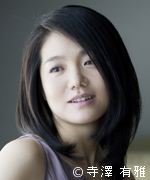
Born in Nishinomiya (Japan), moved to Düsseldorf (Germany) with her family where she started to study piano under Kyoko Sawano.
There are two mentors in Kawamura’s musical education: Malgorzata Bator-Schreiber in Göttingen who built her up musically and artistically, and Prof. Vladimir Krainev at the Hannover University of Music and Drama who developed her further to an artistic personality.
After numerous outstanding successes at renowned international piano competitions, Kawamura’s international concert career began. She won the first prizes at the Concours Clara Haskil in Vevey, the A. Casagrande International Piano Competition in Terni, the G.B. Viotti International Music Competition in Vercelli and the European Chopin Competition in Darmstadt, she became laureate at the Concours Géza Anda in Zurich, the ARD International Music Competition in Munich and the Queen Elisabeth International Music Competition in Brussels.
She has performed with such orchestras as the Bavarian Radio Symphony Orchestra, the Nationaltheater-Orchestra Mannheim, the Munich Chamber Orchestra, the Vienna Symphony Orchestra, the Tonhalle Orchestra Zurich, the Bern Symphony Orchestra, the Lausanne Chamber Orchestra, the Radio Symphony Orchestra Moscow, the Moscow Virtuosi, the Slovenian Philharmonic, the National Philharmonic Orchestra of Ukraine, St. Petersburg Philharmonic Orchestra, Rundfunk Sinfonieorchester Berlin, the NHK Symphony Orchestra, the Tokyo Philharmonic Orchestra, the Japan Philharmonic Orchestra, the Yomiuri Symphony Orchestra, the Kyoto Symphony Orchestra and worked together with conductors like Paolo Arrivabeni, Vladimir Fedosseyev, Thierry Fischer, Theodor Guschelbauer, Junichi Hirokami, Norichika Iimori, Eliahu Inbal, Daniel Inbal, Kenichiro Kobayashi, Fabio Luisi, Erwin Lukac, Eiji Oue, Tatsuya Shimono, Saulius Sondeckis, Vladimir Spivakov, Alexander Dmitriev, Marek Janowski among many others.
In 2012, she performed with Roger Norrington and NHK Symphony Orchestra as well as with Michael Pletnev and Russian National Orchestra in Japan and in the fall of 2013 she is to make her concerto tour with the Czech Philharmonic in Japan.
Her recordings include an all Chopin album titled “Hisako Kawamura plays Chopin” and ‘Chopin Sonata No. 3 and Schumann Humoresque’ both released by RCA Red Seal receiving high acclaims from music critics. There are two further CD recordings available; one with works by Mozart, Schubert and Prokofiev from “DiscAuver” label, another with works by Schubert and Schumann from “audite” label.
Kawamura’s music activity was also awarded by three important Music Prizes in Japan in 2009; the Fresh Artist Music Prize of the Nippon Steel Corporation, the IDEMITSU Music Prize of Idemitsu Kosan and the Prize of the Chopin Society Japan. The Minister Recently in March 2012, the Minister of Education, Culture, Sports, Science and Technology of Japan has awarded Kawamura, Art Encouragement Prize for New Artists of Music.
Czech Philharmonic Orchestra
For over a century, the Czech Philharmonic has represented the pinnacle of Czech cultural achievement, delighting audiences around the globe with its unique sound. Antonín Dvořák conducted the Czech Philharmonic in its debut performance on 4 January 1896 at the Rudolfinium in Prague, which is still home to the orchestra’s Prague concerts, and is now the centre for its new Orchestral Academy.
Gustav Mahler chose the Czech Philharmonic to give the world premiere of his Symphony No.7 in 1908, conducting the orchestra in this milestone performance. The Czech Philharmonic’s international reputation grew under the direction of Václav Talich (Chief Conductor, 1919?1931/1933?1941). Under Talich, the Czech Philharmonic made its first phonograph recording in 1929, recording Smetana’s Má Vlast for His Master’s Voice.
Talich’s leadership was followed by other outstanding Czech conductors, including Rafael Kubelík (1942?1948), Karel Ančerl (1950?1968) and Václav Neumann (1968-1990). Ančerl’s reign ushered in the Czech Philharmonic’s busy touring schedule. The orchestra has toured concert halls and festivals in musical centres across the world, including China, Germany, Italy, Japan, Spain, the United Kingdom, the United States of America, and many others.
Jiří Bělohlávek was appointed Chief Conductor of the Czech Philharmonic in 1990, having forged a dynamic relationship with the orchestra as guest conductor, working closely with Václav Neumann. In the wake of Bělohlávek’s achievements with the Czech Philharmonic, Gerd Albrecht, Vladimir Ashkenazy, Zdeněk Mácal, and Eliahu Inbal have taken the role of Chief Conductor. As of 2012, this journey has come full circle: in a much-anticipated reunion, Jiří Bělohlávek returns as Chief Conductor of the Czech Philharmonic.
Of this reunion, Jiří Bělohlávek stated: “The Czech Philharmonic is a first-rate brand brand and is recognised in the world as a prestigious orchestra. I would like to return it back to its traditions of hard work and high artistic aspirations, to achieve the level that our best orchestra merits. Most of all I would like to give the Czech Philharmonic once again the joy of music.”
The partnership between Jiří Bělohlávek and the Czech Philharmonic is among the most celebrated in the orchestra’s history. Together they have given significant world-premieres, including works by Jan Klusák and Milan Slavický, as well as critically successful performances of famous Czech works and the mainstream orchestral repertoire. The Naxos label wrote of Bělohlávek’s discography: “His most outstanding recordings are those in which he leads the Czech Philharmonic Orchestra, where the high calibre of orchestral execution and Bělohlávek’s deep musicianship result in performances of exceptional quality.”
The Czech Philharmonic has received numerous awards and nominations, including ten Grands Prix du Disque de l’Académie Charles-Cros, five Grand Prix du Disque de l’Académie française, several Cannes Classical Awards, a position in Gramophone’s Top 20 Best Orchestras in the World (2008), as well as nominations for Grammy and Gramophone Awards. Of a classic recording with Neumann, Classic FM Magazine described, in a review of 2011: “…the Czech Philharmonic in its finest vintage ever… unforgettable music-making.”
The Czech Philharmonic has welcomed as Principal Guest Conductor some of the world’s most prestigious interpreters of the orchestral repertoire, including Sir Charles Mackerras. With Mackerras, the Czech Philharmonic made numerous definitive recordings, which garnered effusive reviews in the international press. Of the Czech Philharmonic’s recording of Suk’s Asrael Symphony, the Sunday Times noted, in 2011, “… the advantage of an orchestra that has lived and breathed this music for 100 years”.
Of the same disc, the Financial Times wrote: “The Czech Philharmonic’s live performance breathes a conviction and beneath-the-skin rapture that you won’t find in any other recording.”
To be thus described in 2011 demonstrates an orchestra returning to the high standards of its golden age with exceptional, internationally-acclaimed performances. Under the baton of the inimitable Jiří Bělohlávek from 2012, the Czech Philharmonic looks forward to entering a new era, combining tradition with innovation as an orchestra at the height of its powers.
Hosts
Presented by Japan Arts
Supported by MUZA Kawasaki Symphony Hall / Embassy of the Czech Republic / Sony Music Japan International. / KING INTERNATIONAL Inc.

